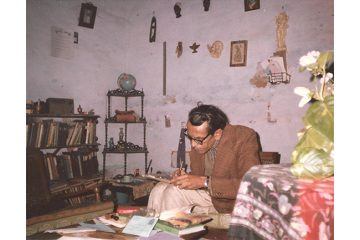Isabel Huacuja Alonso in The Caravan (from 2017):
 “Destitutes Compound,” a story by Naiyer Masud, is about a young man who leaves his home after an argument with his father. After his only friend dies, the man concludes that it is time for him to return to his family. As he makes preparations for his homecoming, he realises that the children he met when he first arrived at the compound now have greying hair. When he returns, he learns that both his parents have passed away, but an old, blind grandmother still sits in the house’s entrance cracking betel nuts, just as she had when he left. The image of the grandmother rhythmically cracking betel nuts has stayed with me for years. To me, she symbolises time itself, resting still, awaiting our return.
“Destitutes Compound,” a story by Naiyer Masud, is about a young man who leaves his home after an argument with his father. After his only friend dies, the man concludes that it is time for him to return to his family. As he makes preparations for his homecoming, he realises that the children he met when he first arrived at the compound now have greying hair. When he returns, he learns that both his parents have passed away, but an old, blind grandmother still sits in the house’s entrance cracking betel nuts, just as she had when he left. The image of the grandmother rhythmically cracking betel nuts has stayed with me for years. To me, she symbolises time itself, resting still, awaiting our return.
Masud is the author of four acclaimed collections of short stories in Urdu. Most of his stories meticulously detail everyday feelings and sensations, but in ways that render them unfamiliar, uncomfortable and new. The narrator of “Ba’i’s Mourners” is consumed by a fear of brides when he learns of one who died from a scorpion bite before reaching her groom’s house. In “Obscure Domains of Fear and Desire,” the narrator describes the complex sensations that old houses evoke in him—some sections of them make him feel afraid, while others evoke an eerie expectation that a distant desire will soon be fulfilled.
More here.
